Christianity and the History of Ideas
According to many secularists, Christian modes of thinking were superseded by radically new, secular philosophies in the age of the Enlightenment. Ever since, or so the story goes, Christianity is struggling to maintain a marginal place in Western society.
The department Christianity and the History of Ideas takes issue with such singular narratives. It analyses the continuing formative power of Christianity from the perspective of a contextualized history of ideas, in which conceptual continuities and transformations are related to their broader cultural contexts. The thrust of the department’s work can be summed up by the slogan “Christian Tradition and the (Post)Secular”—analysing the impact of the Christian intellectual tradition in the past and aiming at new ‘postsecular’ historiographies geared to theorizing the presence and continuing formative power of Christianity in Western/European society.
Below you will find a description of the current PhD research that takes place.
Annelies Abelmann
Roman-Catholic Emancipation in the Rhine-Meuse Region and the Interior decoration of Churches during the Lifetime of Sculptor Friedrich Wilhelm Mengelberg (1837-1919)

This PhD-research focuses on the life and works of Friedrich Wilhelm Mengelberg in the Rhine-Meuse region in the context of the social and political developments within the Roman-Catholic church. The historistic restyling of the church architecture and interior decoration on the iconography and iconology will be in the centre of my study.
Wilhelm (Cologne 1837-1919 Utrecht) was brought up as an Evangelical but became Catholic at the age of 19 together with his older brother Philippe and younger brother Otto. Trained as an architect at the ‘Mengelberg’sche Sontagschule für Bauleute’ by his grandfather, his father and Friedrich (von) Schmidt and afterwards in the ‘Kölner Bauhütte’, he moved over to the profession of sculptor and became one of the leading artists in church decoration in the archbishoprics of Cologne and Utrecht.
Together with his two brothers and three sons, he managed two studios which produced an overwhelming amount of church art varying from high qualified artworks to minor objects fabricated in a nearly industrial way.
He moved very smoothly on the tides of the Catholic movement in the Rhine- Meuse region under the popes Pius IX, Leo XIII, Pius X and Benedictus XV adopting the neogothic style and the Marian devotion in his iconography and iconology, but also experimenting with the style of the School of Beuron in mural paintings.
Promotor: Prof. Todd Weir
Primary Supervisor: Dr Andrew Irving
Baltazar Acebedo Jr.
The Appeal of Filipino Catholics to the Vatican for 'Asianization' of the Philippine Catholic Church: Their Struggle during the Decolonization Movements from 1945 to 1999

My research aims to trace when the interest for 'Asianization' (or more particularly, Filipinization) of the Philippine Catholic Church emerged and how it developed through the decolonization movements in the country from 1945 to 1999. It intends to explore what 'Filipinization' may mean in terms of administration, theological thought, spiritual practice, and pastoral approaches for the local churches in the country. It is interested on how the transnational relations between the Catholic missions in the country and the Vatican played its role on the restructuring of Filipino identity on the practice of the Catholic tradition as a majoritarian movement in an Asian country, dealing with the FABC tripartite dialogue with other religions, with different cultures, and with the poor.

Dewirini Anggraeni

Dewirini Anggraeni is a PhD Candidate at the School of Religion, Culture and Society at the University of Groningen, Netherlands. Her research, titled "Social Media and Identity Transformation: A Case Study of Indonesian Women Involved in Terrorism," is driven by her extensive work in preventing and countering violent extremism (P/CVE).
As the founder of the Society Against Radicalism and Violent Extremism (SeRVE Indonesia), she has dedicated over 15 years to working with women and children of bombing perpetrators and victims. Her efforts have focused on inculcating values of forgiveness, tolerance, and non-discrimination to empower women as agents of peace in Indonesia.
Her experience includes collaborating with Women without Borders in Vienna, Austria, on the "Mother School" project and serving as a trainer in female leadership workshops in partnership with the Indonesian Ministry of Women Empowerment and Children Protection of Indonesia.
She holds a Bachelor of Arts in English Literature at State Islamic University, Indonesia, and a Master of International Relations from Deakin University, Australia, earned via an Australia Awards scholarship, and has contributed to several publications including "Countering Violent and Hateful Extremism in Indonesia" published by Palgrave Macmillan in 2023.
Maurice Backschat
Helmuth Schreiner und Karl Themel. Nationalkonservative Volksmissionare mit unterschiedlichen Lebensläufen

The perception of the German Protestant clergy during the Third Reich was for a long time undifferentiated. Sympathy towards National Socialism and antisemitism were common among churchmen. Especially the fear of menacing ‘godless’ atheism, Communism and secularizing tendencies resulted in ambivalent and sometimes opportunistic perceptions of the compatibility of völkisch thought and National Socialism with (Christian) religion.
This PhD will be a typological examination of two Protestant theologians that will provide insights into the accounts of single actors, but also illuminate the ‘unaffiliated middle’ of the Kirchenkampf. Based on original archival research, this research compares work and life of two important Protestant theologians of the interwar period, Helmuth Schreiner and Karl Themel.
They lend themselves to an examination of the key intellectual, theological, ethical and political challenges that faced German Protestants, precisely because they responded to many of the same threats (secularism, communism, National Socialism) and from within some of the same institutions (Innere Mission), yet they arrived at quite different places in the crucial years from 1931 to 1945. Themel became a National Socialist, who was lifted into high positions in 1933 and later took part in the Holocaust, while Schreiner chose partial resistance.

Iris Busschers
Rethinking Missionary Lives: Collective biography, missionary memory, and historiography in the context of Dutch Calvinist Missions to Papua and East Java, c. 1900—1949
In this PhD project I analyse lives of missionary workers who were active on North-West Papua and East Java for the Dutch Calvinist Samenwerkende Zendingscorporaties between c. 1900 and 1949. Particular attention is paid to the interplay between the lived experience of workers at their mission site and the memorialisation, narration and monitoring of missionary lives in the Netherlands. The project sheds light on the circularity of missionary identity narratives, by portraying how individual biography, missionary memory, and mission historiography are intrinsically related to each other. Furthermore, by highlighting the influences of intersectionality, or in other words race, class, gender, generation, family, etcetera the project traces practices of inclusion and exclusion in the missionary community then and now. Moreover, by offering a deep contextualisation of mission in the circumstances in Dutch colonial Indonesia, the Netherlands, and the transnational missionary community, the project argues that Dutch Calvinist mission and the individual workers it comprised were often not the isolated actors historiography so often suggests.
Linde Draaisma
A Sea of Voices – Climate Change and Ontological Imaginaries in the Great Barrier Reef
Collaboration between the Faculty of Religion, Culture and Society at the University of Groningen (The Netherlands) and College of Science and Engineering at James Cook University (Australia)
This PhD project provides an exploration of local interpretations of climate change, in this case around climate disturbance events, such as coral bleaching, in the Great Barrier Reef (GBR). The focus lies on how local Indigenous people make sense of and respond to climate disturbance events affecting the reefs, and how such understandings interact with dominant discourses around these events based on climate science. These understandings and responses are studied in the context of actors’ ontological imaginaries, a concept based on Taylor's concept of social imaginaries (2007). Ontological imaginaries include ideas about nature and humanity in relationship with each other, and possibly also with the divine. By bringing different voices into conversation with each other, I hope to contribute to a more inclusive and nuanced understanding of climate change impacts on the GBR. Additionally, as a collaboration between the College of Science and Engineering at James Cook University and the Faculty of Religion, Culture and Society at the University of Groningen, this project aims to demonstrate the significance of combining climate science with more human-centered disciplines, such as anthropology and religious studies, in order to better understand the consequences of climate change.
Promotor and first supervisor:
Dr. Erin Wilson
Second supervisor:
Dr. Sean Desjardins

Christoph Grüll
Within and beyond the nation-state: Faith-based initiatives in the European refugee crisis
Forced migration and displacement have reached unprecedented dimensions, which has intensified the pressure on the EU’s migration system and political turmoil. Heated dispute on the EU’s external and internal borders, tensions among member states, and much civil societal activism both pro- and anti-immigration have moved towards the center of the attention. How to deal with these challenges? What are the legal and moral obligations of European and national politics? What are the capacities within civil society to accommodate large flows of refugees? In this emerging situation, numerous civil society organizations become involved in both supporting and challenging the state in responding to displacement. The contestation and polarization of the moral, legal, and political obligations and possibilities that are at stake in refugee aid reveal the depth of these debates and that simple approaches do not meet the demands of such complex challenges. While critiquing state-centric approaches to forced migration, cosmopolitan ideals of justice often fail to offer concrete strategies and perspectives for policymaking.
In my project, I engage with these debates and struggles at the level of civil society by looking at actors designated as faith-based organizations. Mosque and church communities play a particularly active role in different European countries in accommodating and assisting refugees. They participate in traditions of sanctuary that predate the nation-state and are yet part of its structure. While they are highly relevant in offering concrete help, they are often overlooked both in public and policy discourse as well as in academic debates on cosmopolitanism. My project addresses this gap. In conducting qualitative research with faith designated groups, organizations, and networks that are involved in refugee aid and advocacy work in different European countries, my aim is to gain insight into the ways how ideas of hospitality, justice, and sanctuary are negotiated, contested, and made productive.
The project brings into view understudied aspects of scholarship on cosmopolitanism (both top-down and from below), social movements, and an empirically informed perspective on the study of political secularism and its contestation. By mapping the work of faith-designated groups in the current European “refugee crisis,” I hence ask whether and, if so, how such groups and initiatives are involved in negotiating, contesting, and potentially reconciling the seemingly opposed positions of state-centric and cosmopolitan approaches to forced migration.
Contact: Christoph Grüll
Ediz Hazir
Turkish Nationalist Movements and Turkey’s Roman Catholic - Community: From the Young Turk Revolution (1908) to the end of Single-party Period (1946)

The history of the Roman Catholic Community of Istanbul was influenced by internal and external factors affecting the Ottoman Empire, such as: heavy territorial losses, military defeats, late modernization, the rise of Nationalism and the collapse of the economy in Nineteenth Century. The building of the Turkish Nation-State after the Turkish War of Independence started a new chapter for non-Muslims of the Ottoman Empire. The research focuses on the consequences of Turkish Nationalist movements on Turkey’s Roman Catholic Church and its community throughout the Ottoman Empire and the newly formed Turkish Nation-State. The study analyzing the time interval between the Young Turk Revolution of 1908 to the end of the Single Party Period (1946) also examines the changes in the lives of Roman Catholic Community from the multicultural and theocratic Ottoman Empire to secular Turkey where citizenship (as defined during the single-party period) was based on different governments’ aims to establish a single religion (the Sunni sect of Islam) and a single language (Turkish) despite signifying a political-territorial definition of Turkishness at the time of its original constitution.

Mirjam Hofman
Similarities and differences between ‘evangelical’ and ‘reformed’ protestants in the Netherlands, 1750-1950
My research project deals with the relation between evangelical and reformed protestants in the Netherlands. According to a famous definition, evangelicals are characterized by their conversionism, activism, biblicism and crucicentrism. Their origins can be found in international revival-movements. Reformed protestants orient themselves on the Calvinistic reformation and acknowledge certain – ‘reformed’ – confessions of faith.
I want to know (1) how evangelical and reformed protestants in the Netherlands dealt with the past, when defining their own identity, (2) how the understanding of the past of both groups developed during the course of time, and (3) how the differences between the so-called memory-cultures of both groups can be explained. Since attitudes towards past, present and future are interwoven, expectations of the future will also be taken into account.
My ultimate aim is a historical overview of the relation between evangelical and reformed protestants in the Netherlands, to answer the question in which ways both groups are affiliated with each other, and in which ways they differ from each other.
I will try to answer my research question by looking at the position of the Moravian brethren in the Netherlands, the Dutch League of Free Evangelical Congregations (‘Bond van Vrije Evangelische Gemeenten’), and the so-called Maranatha movement around Johannes de Heer (1866-1961).
Contact Mirjam Hofman
Pieter Koekkoek
Reformations in ‘Het Eemland’ 1520-1620
The reformation of the Netherlands during the 16th century has been studied from several perspectives. The emphasis in these studies lays with cities, based on ecclesial sources. However, research regarding the daily implementation of the reformation on the countryside is limited. This is mainly due to a lack of ecclesial sources in these areas. This research project focuses on small villages in the area: ‘het Eemland’, in the North-Eastern part of the province Utrecht. The reformation hit this area after the Western provinces (post 1581), and it was only after the synod of Dordrecht (1619) that the ‘classis’ structure is formed. Eventually, a few of the villages became predominantly Calvinistic, while other villages maintained a larger minority, or even majority of Catholics. The main research question for this project is: How has the process of the diverse reformations taken place within the smaller villages of the Eemland between 1520-1620 and which factors influenced the development of the religious relations visible after 1620? To answer this question, the current study makes use of both ecclesial and non-ecclesial sources.
Pieter Koekkoek


Jeannette Kreijkes–van Esch
The Paradoxical Reception of Ancient Texts in the Early Modern Period: Chrysostom’s Influence on the Humanist and Reformer Calvin

As a Reformer it was John Calvin’s (1509-1564) intention to restore the state of the original Christian Church (until the 5th century). He considered the Early Church to be ‘primitive and purer’ compared to the later corrupt Church of his day. In his time the Latin translation of Scripture was used and it was primarily known by the clergy. Calvin was convinced of the necessity of understanding the Bible by common people. The patristic literature could be helpful to make Scripture accessible for ordinary people. So, it was not only the Humanist motto Ad fontes! – back to the sources – which moved him, but even more, the fact that knowledge of Scripture was a matter of eternal salvation.
In his writings Calvin refers to the Church Fathers relatively often, and especially to John Chrysostom (ca. 349-407). Chrysostom, whose name means ‘Golden mouth’, had been educated in classical rhetoric at Antioch, in the school of Libanius, one of the most noted pagan rhetoricians in his days. After he had become committed to Christianity, he studied theology at the School of Antioch, under Diodorus of Tarsus.
This study covers the exegetical relationship between Calvin and Chrysostom. The exegetical relationship between the two Johns appears not only from the fact that Chrysostom is the most cited Church Father in Calvin's New Testament commentaries, but also from a substantial fragment of the Praefatio in Chrysostomi Homilias (the ‘Praefatio’). Calvin wrote this unfinished and unpublished Latin preface to his intended translation of Chrysostom’s sermons into the vernacular. In the Praefatio Calvin mentioned - although he admitted that Chrysostom was not as sound as he ought to have been in the doctrines of election, free will and human virtue - that he appreciated Chrysostom for his commitment to the genuine, simple sense of Scripture.
Remarkably, despite Calvin’s preference for the straightforward meaning of the text, he occasionally but infrequently, makes use of allegory, just like Chrysostom does. This research intends to explain this paradox on the level of biblical interpretation by analyzing allegories and typologies in the works of Calvin and Chrysostom by focusing on the role Chrysostom played in Calvin’s commentaries.
The purpose of this research is to contribute to a clearer insight into the early modern reception of ancient texts and in particular into biblical interpretation in both the early church and Reformation periods.
First supervisor: Prof. Dr. H. van den Belt
Second supervisor: Prof. Dr. J. Leemans
Zoe Longworth
Investigating the Ethical Implications of Divine Wrath

The focus of my research project is on understanding the ethical consequences of belief in God’s wrath from a Christian philosophical perspective. God’s wrath can be a controversial topic that sits uncomfortably with the contemporary culture of suspicion towards negative emotions. However, it remains an important theme in lived religion. A lot has been said about the wrath of God, as well as the ethics of (human) anger, as individual areas of research, but I find there to be somewhat of a gap in the present literature in terms of considering the overlap between God’s wrath and its potential influence on understanding our own anger and its ethical implications. God is viewed as the epitome of moral perfection, so what does this say about His anger? Can we therefore justify anger in a human context, or is this merely a case of do as I say and not as I do? Understanding how belief in God’s anger has the potential to influence our own behaviour is an important part of philosophy of religion that I hope to meaningfully investigate over the next four years.
Johan Mouthaan
Divine Promises in Seventeenth Century Reformed Theology
Since Martin Luther’s revolutionary rethinking of the concept of the divine promises as the object of justifying faith and the foundation of assurance for salvation, the promises of God developed into a distinct theme in Protestant Theology. Early modern theologians have integrated the concept of divine promises into many theological loci, for example: Christ, faith, justification, predestination, vocation, the sacraments and the means of grace in general.
A lot of studies have focused on the first and second generation Reformers in order to clarify the meaning and function of the divine promises in Reformation theology. It’s the aim of this research project to investigate the meaning and function of the divine promises in seventeenth-century Reformed theology. Because of the unique Reformed position on predestination as distinct from Lutheranism and Arminianism, a separate study on Reformed theology is justified.
By way of three case studies, this project tries to clarify the meaning and function of God’s promises in Reformed theology. The first case study focusses on an academic lecture and disputation of Henricus Alting professor in Groningen from 1627 until his death in 1644. The central issues in this case are the systematic relations between the universality of the divine promises, the doctrine of predestination and the systematical impact of missions and the discovery of new nations. Not only are in this case Lutheran and Arminian positions involved, but also the Saumurian theology concerning universal grace.
The second case study focusses on Edward Leigh, a learned English nobleman, belonging to the Presbyterian party. He wrote extensive theological treatises and also one about the divine promises. He integrate the promises wholly into his doctrine of the covenants and brings a lot of thoughts from Puritan and continental theology together. Surprisingly, he wrote his book in English, not in Latin.
The last case is about a Dutch minister in Kampen, Johannes Teellinck. In 1661 he preached a very well received sermon about the Promises of God as a mean for recovering spiritual diseases. His sermon give a unique perspective on the dynamics of Reformed preaching and the vitality of Reformed theology in helping those who felt spiritually afflicted.
This three very different cases studies can provide more in depth knowledge about the meaning and function of the divine promises in seventeenth century Reformed theology. Starting from the observation that the promises are a recurring topic, the analysis of this three very different cases, will demonstrate its importance from historically contextualized examples. Moreover, it shows how the theological reflection on the promises functioned and how the promises were exactly understood.
J.N. Mouthaan


Thao Nghiem
Religion, State, and Dynamics of Secularism in Post-Colonial Vietnam, 1945-2005
Scholars of religious studies have in recent years repeatedly challenged the Euro-American centrism of the secularist project, arguing that both “the religious” and “the secular” are categories intrinsically rooted in the history and culture of Western Christendom, and subsequently disseminated to other parts of the world following the colonial expansion and imperialism. However, the impact of political secularism, and how these ideas were received, translated, and adopted among societies outside of the North Atlantic rim are heavily understudied. This study aims to address this gap by investigating the role of religion in the governance of the Democratic Republic of Vietnam (1945-1976), subsequently changed into the Socialist Republic of Vietnam (1976-2005), and how religion was deeply integrated into its policy-making and nation-building programs. Specifically, the project explores how North Vietnam’s top leaders negotiated between, on one hand, their ideological fascination of, and pragmatic commitment to, a Marxist-Leninst vision of “scientific atheism,” and on the other hand, an urgent need to mobilize public support and galvanize all segments of the populace in a country devastated by war.

Drawing on extensive archival research in Vietnam (The Vietnam National Archives Center III, the National Library, the Vietnam National Museum of History, and the Ho Chi Minh National Academy of Politics, Archives of the Dominican Seminary, the Vietnam Buddhist Sangha) and France (Archives of The Society of Foreign Missions of Paris (MEP) and The Bibliothèque nationale de France (BnF)), I seek to comprehend the communist authorities’ attitude towards religion and non-belief through a set of research questions, as follows:
-
What constituted legitimate forms of religiosity, thus accepted and tolerated?
-
What was considered superstition, thus needing to be eradicated?
-
How did the Vietnamese communist agents draw boundaries between these categories, in ideological discussion and in practice?
-
How did the secular modernizing policies come into play, with the new-found glorification of pure reason, science, and technology?
-
How did this conceptualization have an impact on their treatment of religion and religious groups?
-
To what extent the religious life of Vietnamese people was disrupted, violently and permanently changed by the regime’s political vision of modernity and concomitant processes of atheisation?

To answer these questions, I delve into communist formal initiatives and socialist programs such as the New Life Movement, the Anti-Superstition Campaign, and the establishment of Patriotic Religious Associations, among others. I will argue that, contrary to the general assumption, the Vietnamese communist state did not seek to systematically exterminate religion, but rather to co-opt and compromise it in service of socialist state-building. In so doing, the study demonstrates the so-called “paradoxes” and “inconsistencies” of political secularism, thereby complicating and rebuffing conventional boundaries of a strict religious/secular demarcation, and contributes to a more nuanced understanding of the entangled histories of the political and the religious.
Giuseppe Paternicò
“Quomodo quilibet debet accipere crucem suam, idest penitentiam”.“Pedagogical” preaching and theological didactics of penance from the sermon corpus of Federico Visconti, Archbishop of Pisa (1253-1277).
PhD Confirmed Proposal
Giuseppe Paternicò - PhD Student
Faculty of Religion, Culture and Society, University of Groningen
Preaching - pedagogy - didactics - medieval sermons - penance
Abstract of my research
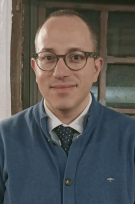
Drawing on the subject and preliminary analysis of my MA thesis which was focused on the predicatio crucis within the homiletic corpus of Archbishop Federico Visconti of Pisa, this doctoral project will broaden its research scope and apply a new approach to the source material. It centres on the “pastoral agency” of Visconti, and in particular on his preaching on repentance/penitence in the face of sin in the heart of the believer. It situates this pastoral practice in the historical, ecclesiological, and ecclesiastical, cultural and social context of Pisa in the first half of the 13th century, as known and filtered through sermon texts specifically chosen from the aforementioned corpus, in dialogue/comparison with other preachers of penance preceding and contemporary with Visconti. Taking into consideration their cultural anthropological traits (gestures, rites, languages, places, customs, materiality), the project aims to reconstruct the effects of learned penance both as seen in Visconti’s work, and as complemented by a wide range of sources (literary, archival, liturgical, artistic). The emphasis in the research project lies on the analysis of the pedagogical-formative methods and the didactic strategies as represented in Visconti’s sermons and of their theological content which was aimed at living, feeling, and experiencing the “accipere crucem suam, idest penitentiam".
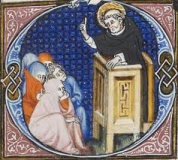
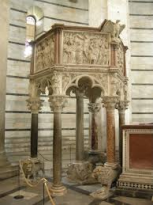
Nick Pouls
Black or White? The Production and Consumption of Patristic Texts in Benedictine and Cistercian Abbeys in the Southern Low Countries, c. 1100-1200
This PhD dissertation project examines the influence of the Cistercians on the book production and consumption of patristic texts by Benedictine monks in the dioceses of Trier, Liège, Cambrai, Tournai, and Thérouanne in the twelfth century, using a palaeographical, codicological and philological approach. Which influence did the rise of the Cistercians have on the production and consumption of patristic texts in the dioceses of Trier, Liège, Cambrai, Tournai, and Thérouanne during the twelfth century? What differences and similarities with respect to the material features of Benedictine and Cistercian book production of and consumption patristic texts through a palaeographical and codicological analysis can be traced in the Southern Low Countries during the twelfth century?
Joas van der Schoot
Philosophy and theology in the work of Christiaan Huygens (1629-1695)

It has been regularly claimed in comprehensive studies of the European Enlightenment that seventeenth-century mechanistic and ‘radical’ philosophy were irreconcilable with early modern theology and religion. In recent scholarship, such sweeping claims have frequently been contradicted, and researchers have pointed to the importance of religion for early modern natural philosophy. The outlined research sides with this revisionist position, and addresses the need for new perspectives on the relation between religion and philosophy in the early Enlightenment period. The project therefore aims to develop nuanced analyses of how ideas associated with radical philosophy were combined with existing religious and theological traditions.
This research focuses on the thought of Christiaan Huygens (1629-1695), against the backdrop of contemporary philosophical debate. The benefits of this focus are twofold. First, it will re-instate Huygens as a major seventeenth-century thinker, and correct the dominant image of Huygens as a solely pragmatic scientist who brilliantly studied isolated natural phenomena, but who refrained from formulating more comprehensive ideas about the world that he studied, and who did not concern himself with matters of theology and philosophy. Secondly, a close study of Huygens´s philosophical ideas will provide valuable insights in the shifting relations between scientific, philosophical, and theological ideas in the second half of the seventeenth century. Taking its starting point in the often neglected speculative philosophical and cosmological works of his later years, especially the posthumously published Kosmotheoros ('Worldviewer'), and a text-critical analysis of the available editions and manuscripts, the proposed project will explore Huygens's fundamental ideas about nature, philosophy, science, God, and mankind.

This research will take the form of a discourse analysis of Huygens’s philosophical texts in the context of important contemporary texts. This approach enables me to also connect his thought to its wider historical context. The first and most important part of the project will focus on the Order of Nature and the more formal and technical aspects of Huygens’s ideas. The second part of the project will also pay attention to the practical, religious, and moral consequences of these ideas for Huygens. His thought will be related to seventeenth-century ideas on anthropology, ethics, and theology. The philosophical ideas expressed in Huygens's final writings, the broader connection of these ideas to his previous (scientific) work, and the comparison of Huygens's thought to contemporary philosophical and theological debate together offer the possibility of a more balanced understanding of Christiaan Huygens as not only a scientist, but also a seventeenth-century intellectual. Moreover, this research will move beyond Huygens and aim to generate further insights in seventeenth-century debates on the natural and divine order, and the relation between philosophy, science and theology.
In summary, the general objective of this project is therefore twofold: to develop a more balanced understanding of the thought of Christiaan Huygens; and to provide further insights in the relation between religion, science, and philosophy in the Early Enlightenment.
Contact: Joas van der Schoot
Juliane Tiemann
The Philosophy of Materiality. Understanding Semiotics and Synergy of Medieval Nordic Charter Production, Use and Societal Changes.

This project focuses on materiality aspects of medieval Nordic charters, particularly those from Norway, and their implications for understanding historical and cultural dynamics. Despite extensive scholarship on the textual content of charters, less attention has been given to the physical characteristics and how these evolved alongside societal and technological changes. By enhancing our understanding of material aspects, this project will contextualize the objects within the broader framework of medieval administrative, legal, and cultural practices, i.e., how these objects functioned within medieval society, and how they were used in legal and administrative processes, contributing to the construction of authority.
To investigate how the physical characteristics and evolving material culture of charters intersect with societal changes, four key research areas will be explored: (1) material properties and semiotics; (2) production techniques and social practices; (3) evolution of charters and the synergy of material and societal changes; and (4) the impact on medieval society's understanding of law, property rights, governance, identity, etc. and as cultural artifacts shaping behavior within this society.
By investigating both the creation and later preservation of charters, the project seeks to uncover new insights into how these documents shaped and were shaped by the societies that interacted with them.
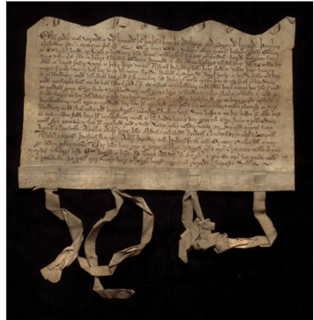
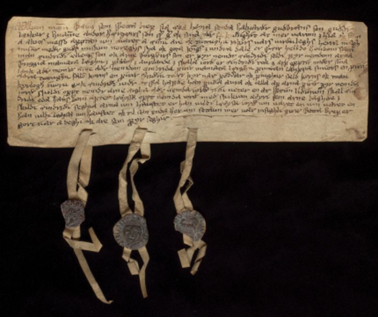
If you want to view previous PhD research, visit our archive.
